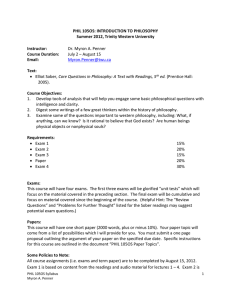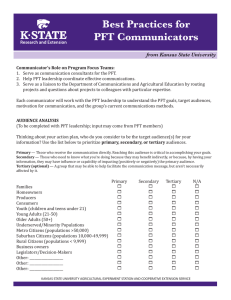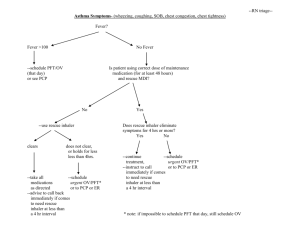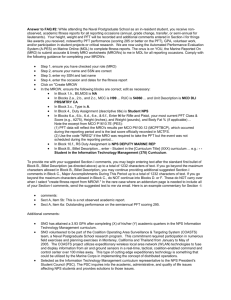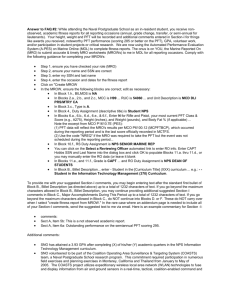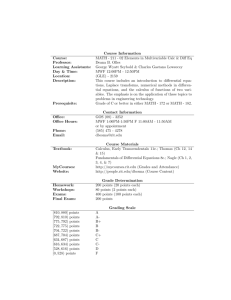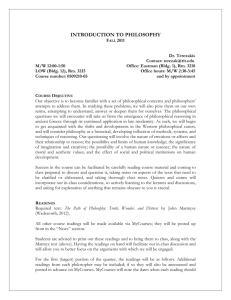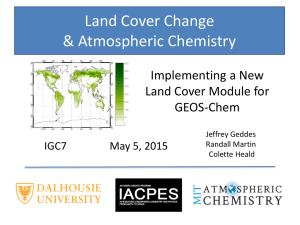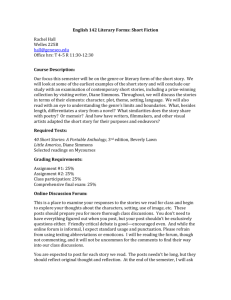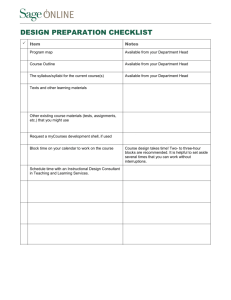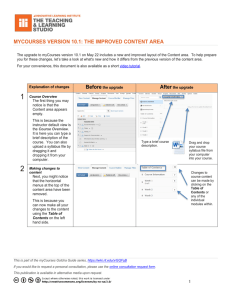PHIL 105OS: INTRODUCTION TO PHILOSOPHY Summer 2014
advertisement
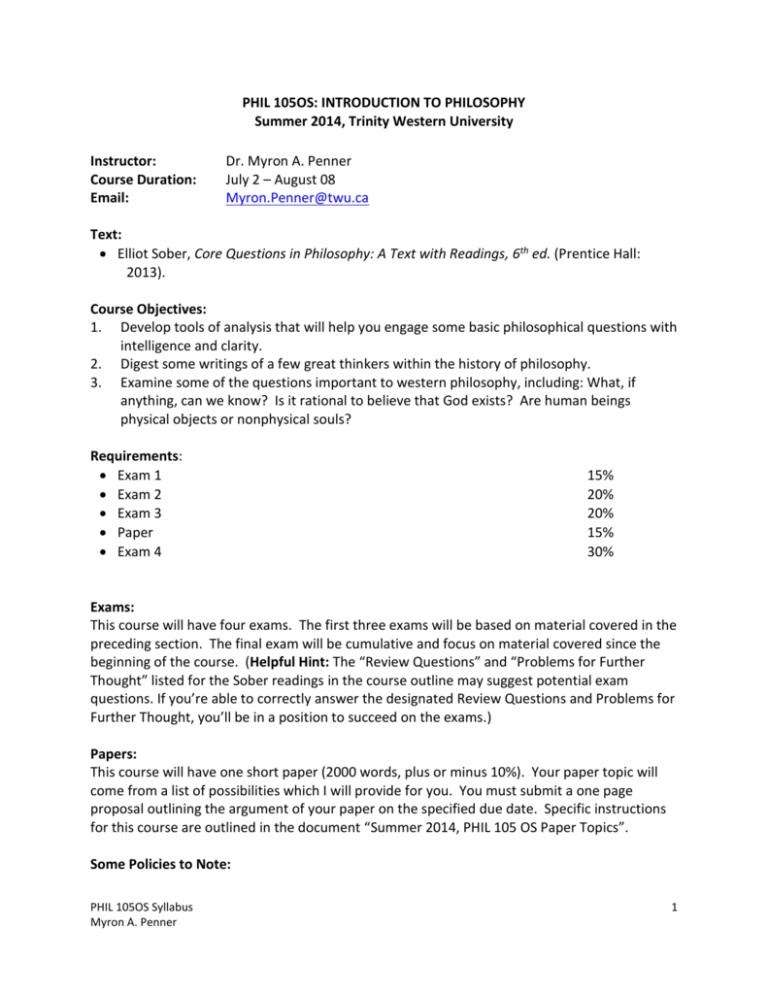
PHIL 105OS: INTRODUCTION TO PHILOSOPHY Summer 2014, Trinity Western University Instructor: Course Duration: Email: Dr. Myron A. Penner July 2 – August 08 Myron.Penner@twu.ca Text: Elliot Sober, Core Questions in Philosophy: A Text with Readings, 6th ed. (Prentice Hall: 2013). Course Objectives: 1. Develop tools of analysis that will help you engage some basic philosophical questions with intelligence and clarity. 2. Digest some writings of a few great thinkers within the history of philosophy. 3. Examine some of the questions important to western philosophy, including: What, if anything, can we know? Is it rational to believe that God exists? Are human beings physical objects or nonphysical souls? Requirements: Exam 1 Exam 2 Exam 3 Paper Exam 4 15% 20% 20% 15% 30% Exams: This course will have four exams. The first three exams will be based on material covered in the preceding section. The final exam will be cumulative and focus on material covered since the beginning of the course. (Helpful Hint: The “Review Questions” and “Problems for Further Thought” listed for the Sober readings in the course outline may suggest potential exam questions. If you’re able to correctly answer the designated Review Questions and Problems for Further Thought, you’ll be in a position to succeed on the exams.) Papers: This course will have one short paper (2000 words, plus or minus 10%). Your paper topic will come from a list of possibilities which I will provide for you. You must submit a one page proposal outlining the argument of your paper on the specified due date. Specific instructions for this course are outlined in the document “Summer 2014, PHIL 105 OS Paper Topics”. Some Policies to Note: PHIL 105OS Syllabus Myron A. Penner 1 All course assignments (i.e. exams and term paper) are to be completed by August 15, 2014. Exam 1 is based on content from the readings and audio material for lectures 1 – 4. Exam 2 is based on content from the readings and audio material for lectures 5 – 12. Exam 3 is based on content from the readings and audio material for lectures 13 – 16. Exam 4 is based on content from the readings and audio material for lectures 1 – 20. All of the exams have time limits and must be completed within two hours of starting the exam. PHIL 105OS Syllabus Myron A. Penner 2 “RQ” = Review Questions; “PFT” = Problems for Further Thought COURSE SCHEDULE: Lecture # Topic/Reading Very Introductory Logic 1 2 3 4 Chapter 1: What is Philosophy? (3-9) RQ: 1, 2 Chapter 2: Deductive Arguments (11-21) RQ: 1-8 PFT: 1, 2 Chapter 3: Inductive and Abductive Arguments (24-37) RQ: 1-4, 6 PFT: 1-3 Chapter 3: Cont’d EXAM ONE Reason and Belief in God 5 6 7 8 9 10 11 12 PHIL 105OS Syllabus Myron A. Penner Chapter 4: Aquinas’ Four Ways (43-56); Aquinas Reading on Mycourses RQ: 1-7 Chapter 5: The Design Argument (59-66) RQ: 1-5 PFT: 1, 3 Hume’s Critique of the Design Argument; Hume Reading on MyCourses Chapter 6: Evolution and Creationism (68-81) RQ: 1, 2, 4 PFT: 1 Chapter 7: Can Science Explain Everything? (83-90) RQ: 1-5 PFT: 1, 4 Chapter 9: Is the Existence of God Testable? (101-107); Ayer Reading on MyCourses RQ: 1-4 PFT: 1, 3, 5 Chapter 10: Pascal and Irrationality (108-116); Pascal Reading on MyCourses RQ: 1-5, 7 PFT: 2 Chapter 11: The Argument from Evil (119-126) 3 RQ: 1-6 PFT: 1, 2 EXAM TWO Knowledge and Justified Belief 13 14 15 16 Chapter 12: What is Knowledge? (137-145) RQ: 1-5 PFT: 2 ES Chapter 13: Descartes’s Foundationalism (147-158); Descartes Reading on MyCourses RQ: 1-4, 7 PFT: 1, 2 ES Chapter 14: The Reliability Theory of Knowledge (161-171) RQ: 1, 4, 5 PFT: 3 Plantinga’s “The Reformed Objection to Natural Theology”; Plantinga Reading on MyCourses EXAM THREE Mind-Body Problem 17 18 19 20 PHIL 105OS Syllabus Myron A. Penner ES Chapter 19: Dualism and the Mind/Body Problem (203-213) RQ: 1-5 PFT: 1, 5 Chapter 22: The Mind/Brain Identity Theory (229-234) RQ: 1-4 PFT: 1, 4 David Chalmers, “The Puzzle of Conscious Experience”; Chalmers Reading on MyCourses Alvin Plantinga, “Materialism and Christian Belief”; Plantinga Reading on MyCourses 4
